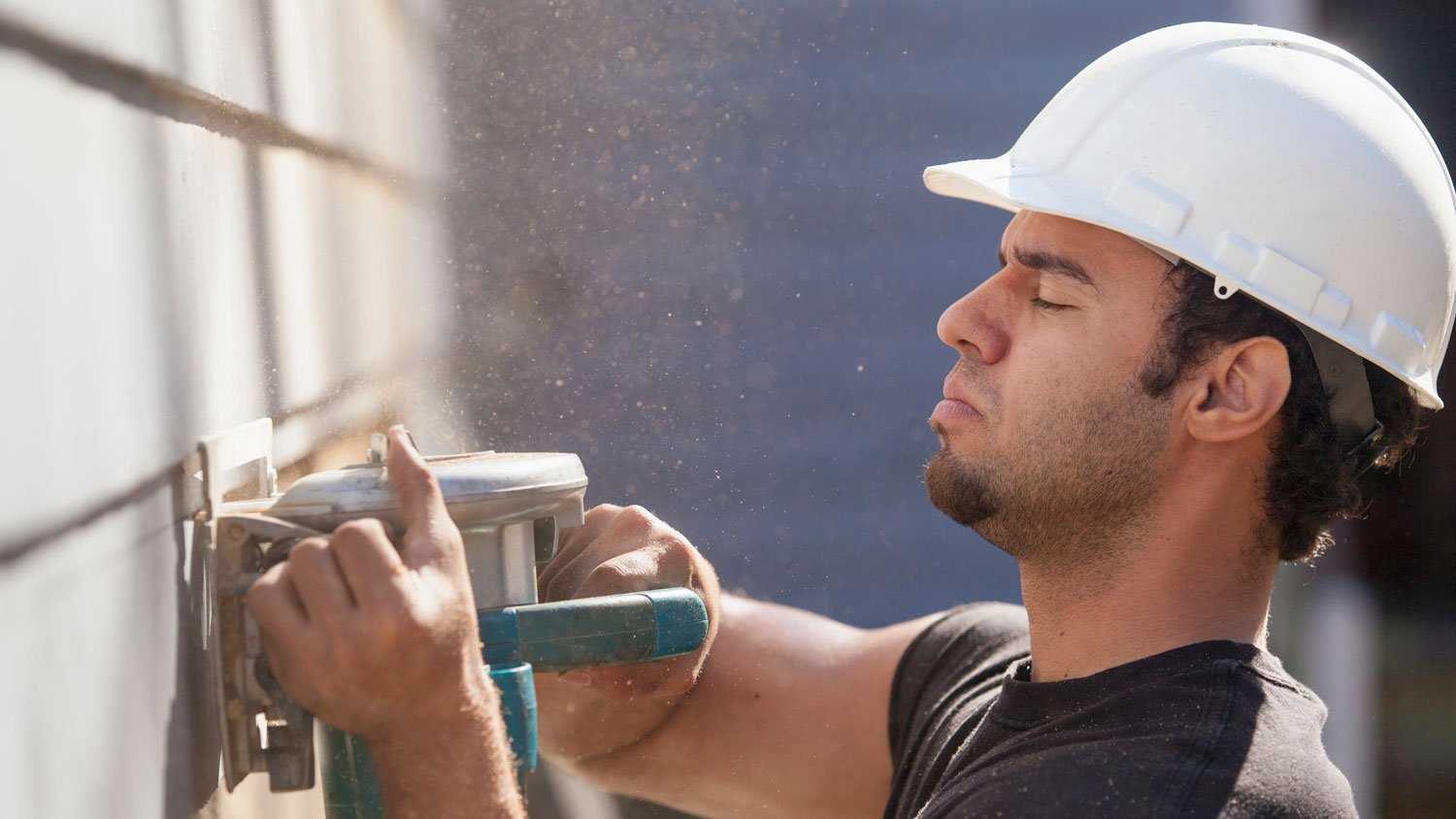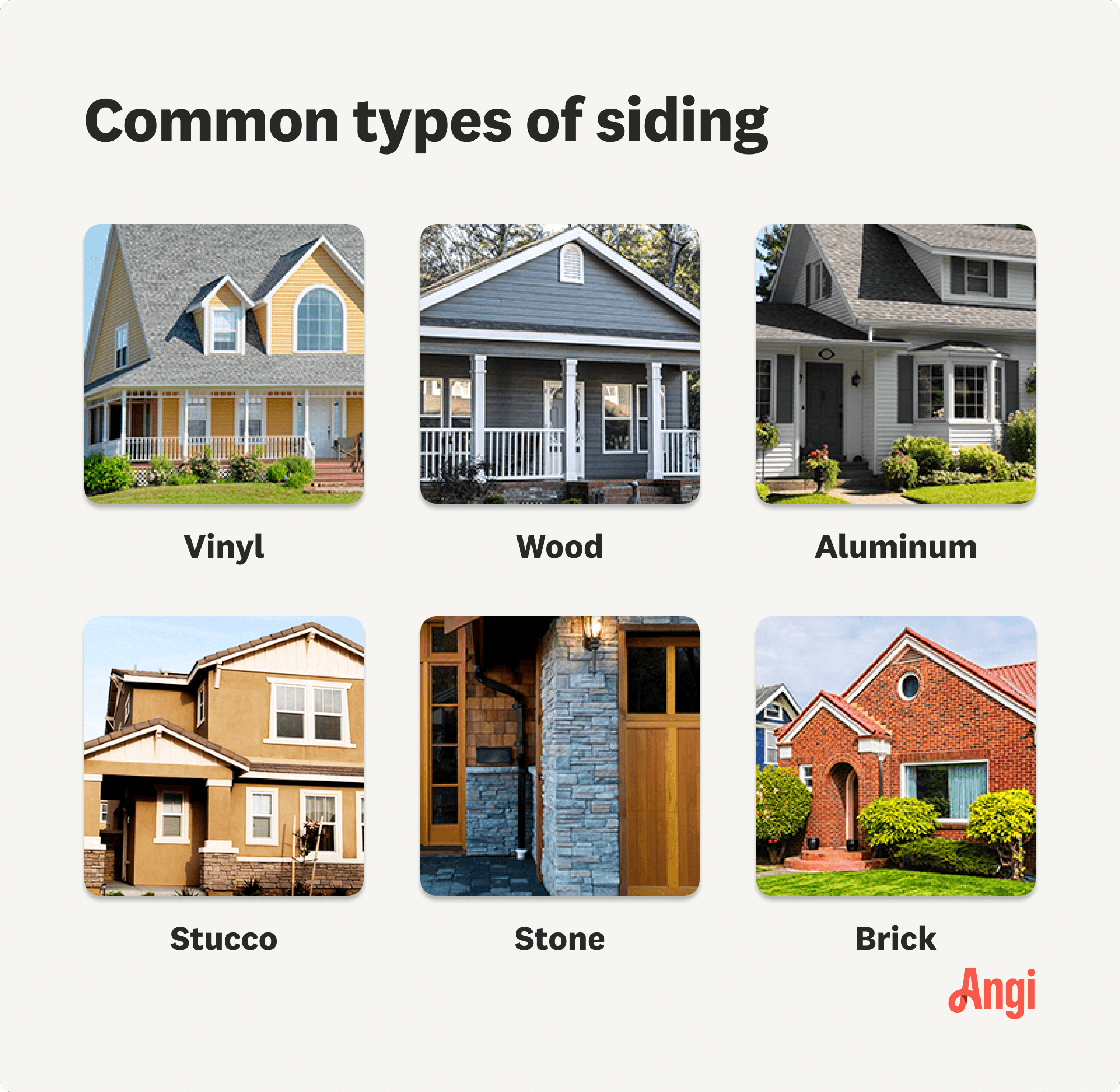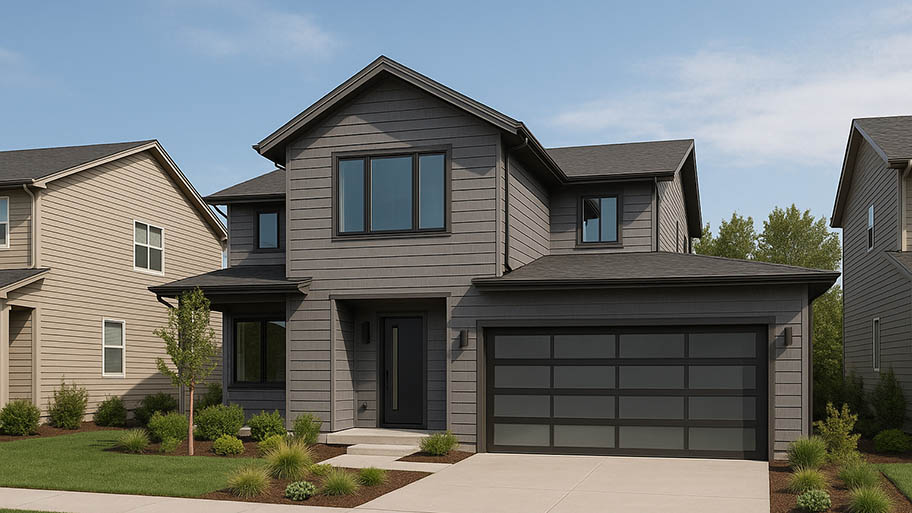
Aluminum siding costs between $4,500 and $19,000 on average, depending on the style, square footage, and local labor rates. Keep reading to estimate your budget.
Siding service costs depend on your project and location. Check with a local pro for your specific job.
Siding repair costs between $2 and $50 per square foot, with an average price of $26 per square foot.
Filling cracks and removing dry rot are the most expensive types of siding repair, running up to $800.
Stucco is the most labor-intensive, at up to $50 per square foot, costing four to 10 times as much as vinyl siding repair.
Siding materials alone range from $1 to $30 per square foot.
Siding repair pros charge between $450 and $820, making up 50% to 90% of your total project cost.
Siding repair costs an average of $915, but your total can range from $75 for minor repairs like painting and replacing damaged boards up to $16,330 for widespread damage or partial replacement. Expect to pay an average of $26 per square foot for labor and materials. Many variables, like the extent of damage and the type of siding on your house, affect the total cost.

The type of repair you need is the most impactful cost factor and will largely determine costs for materials and labor. While some siding fixes are purely cosmetic, others require some structural work and can drive up your total.
| Repair Type | Average Cost |
|---|---|
| Painting | $1.50–$4 per sq. ft. |
| Crack filling | $500–$800 |
| Hole repair | $50–$100 each |
| Replacing damaged boards | $1–$12 per sq. ft. |
| Water damage | $25–$50 |
| Wrapping | $0.50–$2 per sq. ft. |
| Trim repair | $3–$30 per linear ft. |
| Chimney siding | $10–$20 per sq. ft. |
| Mold remediation | $10–$25 per sq. ft. |
| Asbestos tests | $230–$780 |
| Asbestos siding removal | $7–$10 per sq. ft. |
| Siding removal and disposal | $0.60–$1.80 per sq. ft. |
| Dry rot removal | $5–$40 per sq. ft. |
| Termite inspection | $75–$325 |
The cost of most projects depends on the severity of the repair, the quality of the existing siding material, the labor required to repair it, and the materials required to repair it.

The siding material you have on your home will determine how a professional goes about the repair and what kind of labor and materials they’ll need to employ. For example, vinyl siding repair often just involves removing the damaged section and replacing it, while stucco may require a patch and labor-intensive feathering and color-matching to get the stucco texture and color to blend in.
Here's a look at what you can expect to pay per square foot for repairs based on your siding material.
| Material | Average Cost (per Sq. Ft.) |
|---|---|
| Vinyl | $2–$4 |
| Fiber Cement | $3–$11 |
| Wood | $4–$13 |
| Aluminum | $5–$7 |
| Clapboard | $5–$10 |
| Brick | $6–$18 |
| Stucco | $9–$50 |
| Stone | $10–$30 |
On average, you should expect to pay $26 per square foot for siding repair, and costs range from $2 to $50 per square foot. When you hire a siding professional, you’ll have to pay a minimum trip fee, which will fall between $100 and $300. That means your repair costs could total $200, on average, even if you have a single hole that you need your pro to patch.
For more extensive damage, it might be a better idea to remove a large section of material and replace it altogether. This is especially true if the damage leads to leaks that compromise the materials behind the siding. If portions of your siding are beyond repair, the cost to replace siding on portions of your home may be lower than the cost of individual repairs.
| Home Size (Square Feet) | Average Cost for Siding (Vinyl, Wood, Aluminum, Fiber Cement) | Average Cost for Brick or Stone Siding |
|---|---|---|
| 1,000 | $1,000–$13,500 | $9,000–$50,000 |
| 1,500 | $1,500–$20,250 | $13,500–$75,000 |
| 2,000 | $2,000–$27,000 | $18,000–$100,000 |
| 2,500 | $2,500–$33,750 | $22,500–$125,000 |
| 3,000 | $3,000–$40,500 | $27,000–$150,000 |
Labor accounts for between 50% and 90% of your total, or between $450 and $820, depending on the extent of the damage and the type of siding you have. The materials to repair stucco siding, for example, will cost under $100 for minor repairs, but the job is labor-intensive, so most of your money will go toward the labor.
While contractors typically charge by job, some bill by the hour. Most siding contractors who charge based on time charge between $40 and $90 per hour for siding repair.
The brand of siding you have can play a role in the material costs, which affect your total siding repair costs. High-end brands may be more expensive up front if you need a partial siding replacement, but they also tend to last longer and come with longer siding warranties. The table below includes average costs for materials only for some of the larger siding brands available.
| Siding Brand | Type | Cost (per Sq. Ft.) |
|---|---|---|
| CertainTeed | Vinyl | $1–$2 |
| GenStone | Brick veneer | $20–$30 |
| GenStone | Stone veneer | $15–$30 |
| James Hardie | Fiber cement | $4–$7.50 |
| LP Smartside | Engineered wood | $5–$10 |
| Norandex | Vinyl | $1–$4 |
| Ply Gem | Vinyl | $1–$2 |
| Royal | Wood | $5–$10 |
| Tritan BP | Brick veneer | $10–$20 |
| Urestone | Brick veneer | $10–$15 |
Small siding repair projects might just require filling some holes in vinyl siding with caulk or pulling a dent out of aluminum siding with a screw and a washer. Some larger projects may require complete replacement of panels, boards, or masonry. DIYing smaller projects will save you money on labor.
The variation in siding repair projects can lead to a large swing in material costs.
Siding materials themselves range from $1 to $30 per square foot, depending on the material and quality.
For exterior walls, a gallon of paint costs between $20 and $80, but you’ll also need to buy primer and any necessary tools if you DIY.
Caulk costs $0.05 to $0.20 per linear foot. If you don’t have a caulk gun, you’ll need to purchase that, too.
These projects also have tool costs. You may need to buy or rent tools like circular saws, drills, nail guns, and scaffolding—which may ultimately make the cost of a siding repair contractor more affordable.
Due to the intensity of the work, if you're having siding repaired on an upper level, your siding contractor may charge 25% to 50% more for labor.
While most siding repairs are surface-level repairs, you may discover that the damage led to leaks, which could also mean problems with wood rot, mold growth, and water damage behind your siding. Not only will these types of repairs usually require partial siding replacement to access the problem areas behind the siding, but you may need to add hundreds or even thousands of dollars to your total for more extensive work that may not be obvious right away.
Siding improves home value and curb appeal, but it also protects your structure and your family from the elements. It's a good idea to get outside to inspect your siding at least once a season to check for damage. You should also check for the following signs of siding problems following major storms or intense weather.
Impact Damage: If a car, mower, or other object damages your siding, the concern may be more than an eyesore. The impact likely created gaps where water, termites, and other problems can take hold.
Loose or Missing Pieces: What may look like a harmless missing panel following heavy winds can turn into serious rot or mold damage to your home's frame if you don’t address the problem quickly.
Visible Pest Damage: Like missing siding, siding damaged by something like a woodpecker pecking at the house, or termites taking up residence in wood siding can leave your home's framework vulnerable to rot and mold. Check for mud tubes around the foundation, frass left behind under the siding, and visible holes or tunnels in the wood.
Blistered Siding: Blistering or bubbling in siding usually indicates a moisture issue that causes a gap to form between your siding and the top paint layer.
Fungal Growth: If a portion of your siding appears to be growing mold or fungus, it's important to remove or remediate the growth. In addition to cleaning up the situation, you should also try to determine the root cause, which could be vegetation growing too close to your home or a larger moisture issue resulting from improper siding installation.
Cracking or Warping: Cracked or warped siding is usually a sign of water damage hiding beneath siding panels. These problems are common in homes lacking waterproofing to protect against thick snow and wind-driven rain.
Not sure if it makes more sense to repair sections of your siding or just replace it altogether? One of the largest factors you should consider is the age of your current siding—and how long that type of siding lasts. If the siding is nearing the end of its life anyway, it will cost more upfront to replace it, but it could save you money over time.
If your siding damage has led to problems with water damage inside, mold growth, or wood rot, a full replacement is also best, as you’ll likely need to remove the old siding to address the concern anyway.
| Factor | Repair | Replace |
|---|---|---|
| Cost | Repairs cost less than 30% of a total replacement | Repairs cost 50%+ of a total replacement |
| Lifespan | Siding still has 10+ years of life remaining | Siding is within a decade of its expected lifespan |
| Damage | Cosmetic damage only | Leaks, mold, wood rot, or water damage |
If you decide to replace your siding, you can choose a new siding material that preempts any issues you previously experienced—or that simply appeals more to your aesthetic taste.
Suppose you had wood siding that experienced warping or rotting. It might be time to consider investigating the cost of Hardie board siding or vinyl siding to enjoy its weather-resistant qualities. If pest damage or a high-moisture climate caused your existing wood or vinyl siding to fail, aluminum siding's pest-resistant and mold-resistant qualities make it a solid alternative.
We highly recommend having any serious siding damage assessed by a professional: Surface-level siding issues could be tied to anything from structural issues to rot.
Hiring a professional to repair your siding can be expensive, depending on the type of siding and size of your home. If you’re trying to save on costs, consider the following ways to lower the bottom line.
If you only need to replace a few boards and have most of the tools and know-how required to fix up the siding on your house, you can opt to save on labor costs and repair it yourself. If you’re not an experienced contractor, though, this could be hazardous to your health if, say, the siding has asbestos in it. You may also damage your property, causing more expensive damage, so think carefully about whether DIY is a good idea.
Some siding materials are more expensive than others, so consider using a more budget-friendly material to cut costs. Vinyl and aluminum are the most affordable options, Hardie board is a good mid-range material with excellent durability and value, and stone and brick are the most expensive but also boast the longest lifespan.
Depending on where you live and what types of repairs you make, you may qualify for government subsidies, rebates, or other incentives at both the state and federal level. Research energy-efficiency programs in your state or local municipality to find potential savings.
While minor hole repairs in vinyl siding or even single board replacements are DIYable, most siding repairs involving extensive work, siding on the second story, and brick, stone, or stucco are far more complex and require professional help.
If you’ve had water damage or problems with leaks, pests, or wood rot, call a local siding repair company so that they can assess the extent of the damage and make the necessary repairs beneath your siding.
Repairing siding requires specialized expertise and equipment. Here’s why it’s best to hire an experienced pro for the job:
Professionals know how to prevent water damage, rot, and structural issues.
Working with a pro ensures compliance with local building codes, permits, and safety standards.
DIY repairs can lead to leaks, warping, and costly damage.
Reputable pros offer insurance and warranties for additional protection.
Professionally repaired siding boosts curb appeal, durability, and home value.
To help out your pro with the repair process, consider assisting with the following tasks:
Pass tools, nails, and siding pieces to your pro when needed.
Remove landscaping or obstacles from the work area to provide easy access.
Place protective coverings over plants, flowers, and landscaping near the site.
Assist with the cleanup of debris, old siding, and packages once the job is complete.
Clearly explain the type and extent of siding damage to your pro.
Provide your pro with the damage measurements and location so they have a clear idea of the job size.
Ask about upgrades such as insulated siding, decorative trim, or custom finishes.
Let your pro know about any additional damages, obstacles, or accessibility challenges that could affect the project's complexity.
Home is the most important place on earth, which is why Angi has helped more than 150 million homeowners transform their houses into homes they adore. To help homeowners with their next project, Angi provides readers with the most accurate cost data and upholds strict editorial standards. We’ve surveyed over 10,000 real Angi customers about their project costs to develop the pricing data you see, so you can make the best decisions for you and your home. We pair this data with research from reputable sources, including the U.S. Bureau of Labor Statistics, academic journals, market studies, and interviews with industry experts—all to ensure our prices reflect real-world projects.
Want to help us improve our cost data? Send us a recent project quote to [email protected]. Quotes and personal information will not be shared publicly.
There are certain circumstances where your homeowners insurance might cover the expense of siding repair. If you have siding damage due to extreme weather, a natural disaster, a fire, or a hail storm, your policy might fully or partially pay for the repair or replacement cost. However, most policies will not help pay for repairs due to general wear and tear. It’s best to review your homeowners insurance policy for full details on what may be covered.
In certain situations, your homeowners insurance may cover the cost of siding repairs or replacement. If your siding is damaged by extreme weather conditions, a natural disaster, a fire, or a hailstorm, your insurance policy could pay for some or all of the repair or replacement costs. This coverage can be crucial, as severe weather events and disasters can cause significant damage to your home.
However, it’s important to note that most homeowners insurance policies will not cover repairs due to general wear and tear or normal aging of materials. For instance, fading, cracking, or rotting caused by prolonged exposure to the elements is typically considered a maintenance issue and is not eligible for reimbursement.
To fully understand what’s covered, it’s crucial to review your homeowners insurance policy in detail. Pay close attention to exclusions, specific types of coverage for exterior damage, and the conditions under which you can file a claim for siding repair or replacement. It’s also a good idea to consult with your insurance provider to get a clear explanation of your coverage and how to maximize the benefits available to you.
When dealing with siding damage and potential insurance claims, it’s equally important to work with an experienced contractor who can guide you through the evaluation and repair process. A reputable contractor not only helps assess the extent of the damage but can also work alongside your insurance company to ensure that you receive the full benefits of your policy. An experienced contractor will thoroughly inspect the damage and provide an accurate, detailed estimate for repairs. They’ll help document the damage properly, which can be crucial in ensuring your insurance claim is successful. Additionally, they can assist in identifying any potential issues that may have been overlooked, ensuring that you don’t miss out on the coverage that you’re entitled to. Contractors with experience in insurance claims can also serve as advocates, communicating with your insurance provider.
From average costs to expert advice, get all the answers you need to get your job done.

Aluminum siding costs between $4,500 and $19,000 on average, depending on the style, square footage, and local labor rates. Keep reading to estimate your budget.

Typical stone siding costs can surpass $100K, but the huge ROI potential may be worth the investment. Get the full cost breakdown of labor and materials here.

Cedar, pine, cypress, or fir—wood siding is a durable and elegant choice for the outside of your home. Here are the wood siding costs to expect.

Are you wondering what clapboard siding looks like? This explanation of clapboard siding will help you discover when to use clapboard siding, clapboard siding pros and cons, costs, and styles.
.jpg?impolicy=leadImage)
Stucco that isn’t waterproofed leaves your home vulnerable to moisture damage. Learn four ways to waterproof stucco for the most protection.

Learn more about the best types of cement siding and their benefits for your home.